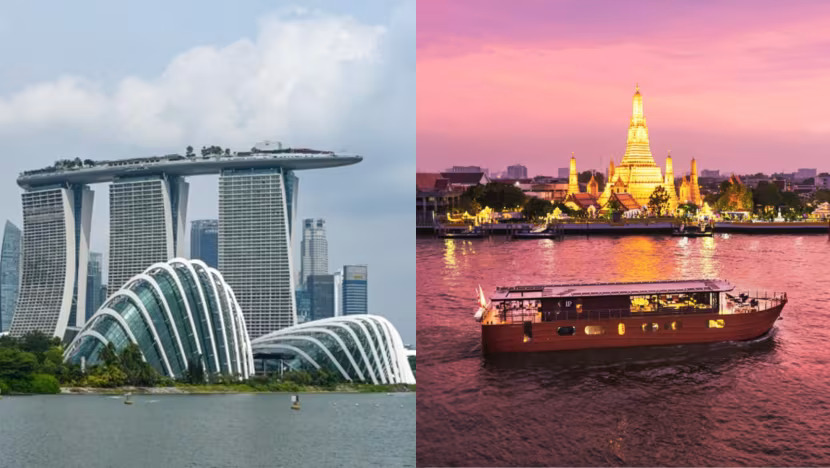Commentary: Will Thailand's 'integrated entertainment complexes' become the new industry leader in Asia?

(Photo credit: AFP)
Source: Channel News Asia
Macao, Genting Highlands, Singapore’s Marina Bay – could Bangkok be the next stop for casino-loving tourists?
Nearly a year after Thailand’s current government came to power, it has made significant strides towards legalising casino gambling, a seed sown more than 20 years ago when Thaksin Shinawatra was prime minister. A draft law may be tabled in parliament this month, with Prime Minister Srettha Thavisin setting an ambitious target to pass it by early 2025.
Thailand’s first legal casino could open by 2029, leapfrogging Japan in launching the next major integrated resort in Asia. MGM Osaka is expected to open in 2030, after securing government approval in 2023. The lightning speed and efficiency of Thailand’s process contrast sharply with Japan's meandering journey to enact its casino legislation.
This swift action comes as Mr Srettha grapples with a slow Thai economy. The allure is clear.
Large-scale "integrated entertainment complexes" – planned for the Eastern Economic Corridor, Phuket and potentially two in Bangkok – could draw in well over US$10 billion in foreign investment, bringing jobs, revenue and a major tourism boost. The kingdom may issue five to eight entertainment complex licences in total.
Thailand anticipates welcoming over 36 million visitors this year, nearing its pre-pandemic peak of 40 million. This robust tourism resurgence bolsters the government's confidence in replicating, and potentially surpassing, Singapore's success with integrated resorts.
FROM MARINA BAY TO CHAO PHRAYA
Whispers of a Chao Phraya riverfront entertainment complex inevitably draw comparisons to Singapore's iconic Marina Bay Sands.
However, Singapore’s success goes beyond the bayfront resort. It is also about the creation of a vibrant Marina Bay downtown district that integrates work, life and entertainment and mirrors the successful reinvention of London's Canary Wharf derelict docks into a prime financial centre.
In that way, Thailand's Khlong Toei district redevelopment vision bears an uncanny resemblance to Singapore's Marina Bay. It aims to repurpose underutilised prime inner-city land for office buildings, hotels, retail spaces, a convention centre, parks, museums and a cruise centre.
The land is currently used by the Bangkok Port, which the government has been keen to relocate out of the capital and which has already seen operations significantly diverted elsewhere.
Redevelopment has been on the books for nearly two decades but has struggled to materialise, despite advocacy from both former prime minister Prayut Chan-o-cha and current Bangkok governor Chadchart Sittipunt. In April, Mr Srettha signalled his support for moving the port to redevelop the area.
Subsequently, local media reported Khlong Toei as a potential site for an entertainment complex, suggesting that this may have been the crucial element to finally turn the blueprint into reality.
ATTRACTING TOP CASINO OPERATORS
However, if Mr Srettha wants to inaugurate an entertainment complex within his term, he will have to look beyond Bangkok.
Chiang Mai in the north or Rayong, about a 50-minute drive from Pattaya on the east coast, would be more realistic for a pilot project. Khlong Toei's redevelopment is likely to span over a decade, echoing the extensive timeline taken for the realisation of Marina Bay.
Nevertheless, even with a later development schedule, the Khlong Toei licence might still be the first to be tendered. Thailand might adopt Singapore’s approach of auctioning concessions sequentially from the most to the least attractive.
This ensures that each licence attracts a strong pool of bidders, maximising competition and value, something Japan crucially overlooked. Without clear guidelines, Japanese prefectures scrambled to plan and schedule their selection processes, inadvertently pitting them against each other to attract casino operators.
Public opposition to legalised casino gambling has been relatively subdued thus far. Using Singapore's model as a benchmark, Thailand is also looking at introducing similar social safeguards, such as entry fees for Thai citizens and limiting the casino area to 5 per cent of the resort.
There remains some lingering scepticism in the investor community about Thailand’s ability to establish and enforce a robust regulatory framework – crucial for attracting top casino resort operators from the United States, who are bound by regulatory requirements to invest only in jurisdictions with stringent regulatory and compliance standards.
But what is clear is that there is political will across the parties to make it happen.
POTENTIAL DISRUPTION TO SINGAPORE, MALAYSIA
Thai entertainment complexes are poised to be a major disruption in the regional casino industry.
Their proximity, combined with Thailand's clear leading position in Asia tourism, poses a particular threat to operators in Singapore and Malaysia. Another factor is the relative affordability of Thailand compared to Singapore.
Differentiation will be the key to protecting the incumbents’ market share. Singapore will need to focus on leveraging its established strength in the premium segment of the market.
Genting’s monopoly in Malaysia has so far shielded it from the emergence of casinos in Macao, Singapore and the Philippines. Its market exclusivity came under scrutiny in April amid rumours of a second casino in Johor’s troubled Forest City property development, to which Malaysian Prime Minister Anwar Ibrahim subsequently gave an “affirmative no”.
Entertainment complexes in the southern Thai provinces of Songkhla and Krabi might pose greater competition to Genting, potentially vying for its key customer markets in Ipoh and Penang.
Ultimately, whether Thai entertainment resorts can become the new industry leader in Asia will depend on three things: Thailand's ability to attract top operators, how it creates a unique experience that blends world-class entertainment with Thai culture, and how Singapore, Malaysia and other Asian jurisdictions up the ante to stay in the game.
Register
Login
Login
Register